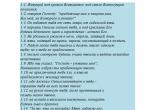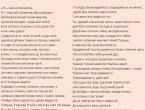Curse of the gods or civilizational inevitability? Why do people speak different languages?
“Why do people speak different languages?” - everyone asks this question in childhood, but not many people solve this riddle for themselves as adults. From time immemorial, people have tried to answer this question: there is a biblical legend, folk tales, and a scientific hypothesis. All these versions are based on one simple fact, which is not difficult to notice even without special linguistic education: even the most different languages very often have a lot in common.
Legends
To the question of why people speak different languages, the Australian legend has its own, very original answer: once upon a time, peoples were divided into “pure” and “impure”. Both were cannibals, but they ate different parts of the body - the “clean” ones ate meat, the “unclean” ones ate internal organs. According to the aborigines, linguistic differences arose from everyday differences.
Tribes from Indochina have their own vision of the problem: each of the races that make up humanity originally had its own dialect. There are six such races in total, and all of them, like branches, curl from the giant “progenitor” pumpkin.
Less exotic, but equally interesting is the version of the Amazon: God divided the languages - he needed this so that, having ceased to understand each other, people began to listen to him more.
In the Iroquois tribe there is a belief that people who once understood each other quarreled and therefore lost their “common language” and began speaking different languages. This separation occurred, according to the myth, not even among strangers, but within the same family!
There is a beautiful legend about languages belonging to the Navajo tribe of American Indians. According to their mythology, they were created by a certain deity, which they call the “changing woman.” It was she who created them in the first place and allowed them to speak her language. However, later she created bordering peoples, each of which she endowed with her own language.
In addition, many peoples have beliefs about a single true, correct language. Thus, the language of the Egyptians was given to them by the god Ptah, and the ancestors of the Chinese were taught their sacred language by the legendary emperors of ancient times.

Bible
There are, however, more familiar explanations for why people speak different languages; according to the Bible (book of Genesis, chapter 11), most are familiar with one of the most interesting Christian parables about the so-called Babylonian Pandemonium.
This legend tells about the sin of the Babylonian kingdom. Its inhabitants were so mired in vanity and moved away from obedience to the Lord that they decided to build such a high tower in their city that it would reach heaven - so people wanted to “get equal” with God. However, God did not allow the sinners to carry out their plan: he confused the languages so that they could no longer communicate - so the Babylonians were forced to stop construction.
Many people know the catchphrase “Babylonian pandemonium.” It means confusion, confusion, turmoil and general misunderstanding - which is what happened when people lost their “common language”. Thus, the Bible gives a more substantiated answer than archaic folk legends about why people speak different languages.

Scientific theory
However, science also provides an equally interesting solution. After all, languages not only differ from each other, but are also classified into families, branches and groups - depending on the degrees of kinship. Thus, the languages of Europe come from the Proto-Indo-European language. Today it is not known to us (it can only be reconstructed), and no written monuments in this language have reached us. But many factors indicate its existence.
However, if there once was, why are there so many of them today? The question of why people speak different languages is explained quite simply from a scientific point of view: language, by its nature, tends to divide almost indefinitely. This happens due to geographic separation. Since humanity began to divide into ethnic groups and states, such groups have ceased to communicate with each other - therefore, the language within each group has developed in its own way.
Language families
There are also more recent divisions into languages. So, for example, Russian, Ukrainian, Polish, Serbian and many others are related: their similarity is noticeable - more or less - even with the naked eye. This happened because they came from the same language family - Slavic. It would seem that the peoples are so close and border each other - but yet so many different ones came out of the Old Church Slavonic language! It turns out that even large territories and cultural differences (just the division between Catholics and Orthodox Christians!) play such a significant role.

What's happening to languages now?
But has language stopped dividing? No matter how it is. It turns out that even now within one language, separated by borders, there is a demarcation. For example, the descendants of Russians who remained in Alaska after its transition to the United States today speak a very strange version of Russian, which “ordinary” speakers, if they understand, obviously do so with great difficulty.
"Different languages" of one people
But even in not so distant areas there are differences. For example, it’s no secret that “entrance” and “front door”, “shawarma” and “shawarma” are one and the same thing, but for some reason both exist. Why does language change within even one country? All for the same simple reason: St. Petersburg and Moscow, Arkhangelsk and Krasnodar are so far from each other that even in the absence of isolation and the existence of federal media, their own characteristics inevitably arise everywhere.

The situation is different, for example, in Germany. If in Russia a resident of the capital is still able to intuitively guess what, for example, “greenery” is in some village dialect, then a German from one region of Germany may not understand at all a German speaking a different dialect.
Why are there so many languages?
There is no single answer to this question, as there is to all questions concerning the distant past. There are several versions. According to one of them, there is a single language from which all others were born. According to another version, Neanderthals developed a person with two mutations in the FOXP2 gene on chromosome 7, as a result of which this person’s body became capable of language.
People began to ask the question of language a very long time ago, since the times of ancient Egypt. Ancient people, when they encountered foreigners, did not understand their speech and considered them second-class citizens. The Greeks contemptuously called them “barbarians” because their speech seemed like a meaningless set of sounds: “bar-bar-var”. Nowadays, with the help of computers, people can recreate many ancient languages based on the roots of modern words. Studying languages from different angles, linguists have discovered that many languages, even at first glance completely different, have something in common. But why are they different? The answer can be based on observations of the languages of modern people. There are words in the Russian language that are called differently in different regions. Some people call “beets” “buryak”, “Thursday” - “chetverik”, “curb” - “curb”. It all depends on the dialects. Neighbors have almost no differences in language; those who live further away have differences in individual words or sounds. But their speech can still be understood. But understanding neighbors' neighbors is no longer so easy. And it’s impossible to make out what those distant people are saying. This is how a new language appears. It is easy to determine that Russian and French are different languages: speakers of one do not understand speakers of the other at all. What is "pomme" in French? It is unlikely that a person who has not studied French will guess that this is an “apple”. And if you compare Russian and Ukrainian: “yabloko”, then there is no need for translation, the word is clear, of course. Despite the fact that the languages are different, people who speak them can easily understand each other - there is a lot in common between them. But in addition to the distance of peoples from each other in terms of distance and time, the appearance of different languages is greatly influenced by geography. On the island of New Guinea, the population speaks almost a thousand different languages! And all because the island’s territory is dotted with mountains and jungles. It is difficult for people to navigate through it, they rarely communicate, they hardly exchange new words, so each village has developed its own language. And linguists call the Caucasus the “mountain of languages”. There was even an old Arabic legend: “Allah had a bag in which different languages were stored. While traveling around the world, he gave each nation one language. But when he traveled around the whole world, except the Caucasus, there were still a lot of languages left in the bag. Allah just "He turned the sack over the mountains and poured out all the languages. Therefore, now each tribe there has its own dialect." There are a lot of such countries and localities with different dialects.
Perhaps you have once wondered why we speak different languages? Agree, this makes our life very difficult. For example, you want to go on a trip somewhere abroad. Starting from the airport and ending with finding accommodation on the spot, all these steps are impossible without knowledge of a foreign language. Fortunately, there is one international language - English. In principle, knowledge of this language is quite enough if you are going to. But, unfortunately, residents of not every country are fluent in English. Where did this difference in languages come from? There are two possible answers to this question: scientific and biblical.
Scientists' version
Historians have put forward the idea of the emergence of linguistic differences back in prehistoric times. The reason for this sudden change in speech lay in their misunderstanding due to the mountains, deserts, and oceans separating the human tribes. Thus, in each tribal group a dialect of the language available at that time appeared. The more people there were, the more the difference in languages increased. After a certain period of time, separate groups of words appeared. Scientists are of the opinion that All languages of the world have a common linguistic basis.
In addition to human ones, there are also artificial languages. This is a language system that was created by people for the purpose of communication between representatives of both nationalities and fantastic works

Why do people speak different languages - The Bible
We all know the biblical story of Adam and Eve. Initially, according to God’s plan, they were supposed to live forever on earth. They were supposed to have children who would later fill the earth. Initially, there was no talk of different languages and misunderstanding of each other. But what happened? The fact is that the first people did not want to live according to God’s standards and sinned by eating the forbidden fruit. What followed? Their descendants began to be born sinful and imperfect.
Centuries after the death of Adam and Eve people began to build the Tower of Babel. For what purpose? They were going to get to God himself. The instigator of this idea was Nimrod. He formed the first city on Earth - Babylon. God didn't like Nimrod's idea and confused the languages of the builders. As a result, people could not continue this ill-fated construction because they no longer understood each other. Nothing has changed since then. But it is quite possible that one day God will decide to unite people again, giving them a single language that will become native to every person on earth.
According to biblical legends, in ancient times people became so proud that they decided to build a city and a tower as high as heaven. But God decided to thwart their plan by mixing the languages of the ancient builders so that they no longer understood each other...
Why do people speak different languages? Linguists are ready to reveal the Babylonian mystery
http://www.zavtra.com.ua/news/socium/49232
Before the great migration out of Africa began, something happened to humanity and a new form of communication emerged. Most modern languages were born during the Ice Age. Having made this conclusion, linguists are getting closer and closer to the origins of speech, comparing their hypotheses with the biblical legend.
According to biblical legends, in ancient times people became so proud that they decided to build a city and a tower as high as heaven. But God decided to thwart their plan by mixing the languages of the ancient builders so that they no longer understood each other. Grandiose construction stopped, and multilingual builders scattered throughout the land.
Linguists have their own view of the problem - language is constantly changing, and there is no barrier that could protect it from these transformations. Invented and borrowed words from other languages are constantly wedged into our communication.
However, for reasons that are not entirely clear, some languages evolve much faster than others. Italian, for example, has remained much closer to classical Latin than French. Lithuanian has many words that exactly correspond to Sanskrit, which was spoken 3.5 thousand years ago.
American linguists conducted a study in an attempt to reduce all the world's languages to a single root. About 50 thousand years ago, something unusual happened to our ancestors in Africa. Moreover, the ancient people, who had existed for at least 150 thousand years, suddenly began to behave differently.
Until then, their behavior hardly differed from the customs of the Neanderthals. They used stone tools and had some form of communication, which scientists suggest was based on gestures, facial expressions and sounds.
The advent of speech accelerated progress. Scientists believe that the new means of communication has allowed humanity to make a huge leap forward. This event was more significant than the computer or biotechnological revolutions combined, experts say.
It is assumed that ancient people developed speech before the great migration from Africa. “Perhaps they were trying to discuss the routes of the upcoming migration to Europe and Asia, and it was not so easy to manage only with gestures in this regard,” the scientists joke.
A team of researchers from the Santa Fe Institute is working to find the “mother of all languages.” The Evolution of Human Languages (EHL) project, led by Nobel laureate physicist Murray Gell-Mann, is creating a unique etymological database about all the world's languages. EHL linguists are trying to reconstruct and then compare ancestral languages, moving ever closer to the origins of human speech. The project has already caused a mixed reaction from the scientific community. Many linguists are convinced that beyond the threshold of eight thousand years, all attempts to find the root of a language are unreasonable.
EHL linguists were only provoked by the criticism. They grouped all the world's languages into 12 linguistic superfamilies, four of which (including the languages of Eurasia, North Africa, Oceania and possibly the Americas) were experimentally combined into one company, calling it Borean (meaning “northern”). The ancestor of most modern languages, according to researchers, appeared 16 thousand years ago, when glaciers covered most of North America and Europe.
Linguists continue to develop their hypothesis. They seem to have proven how the lion's share of Eurasian, American and North African languages could be formed from one linguistic group.
In their opinion, the Ice Age is to blame for everything. 20 thousand years ago, at its peak, humanity lost most of its linguistic diversity. As the glacier moved south, people migrated with it and mixed with each other both genetically and linguistically. As a result, a complex “linguistic puree” was formed, which scientists tried to disassemble.




